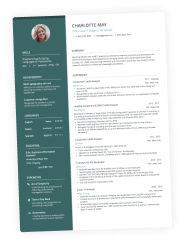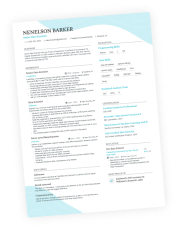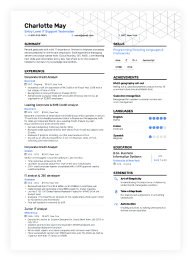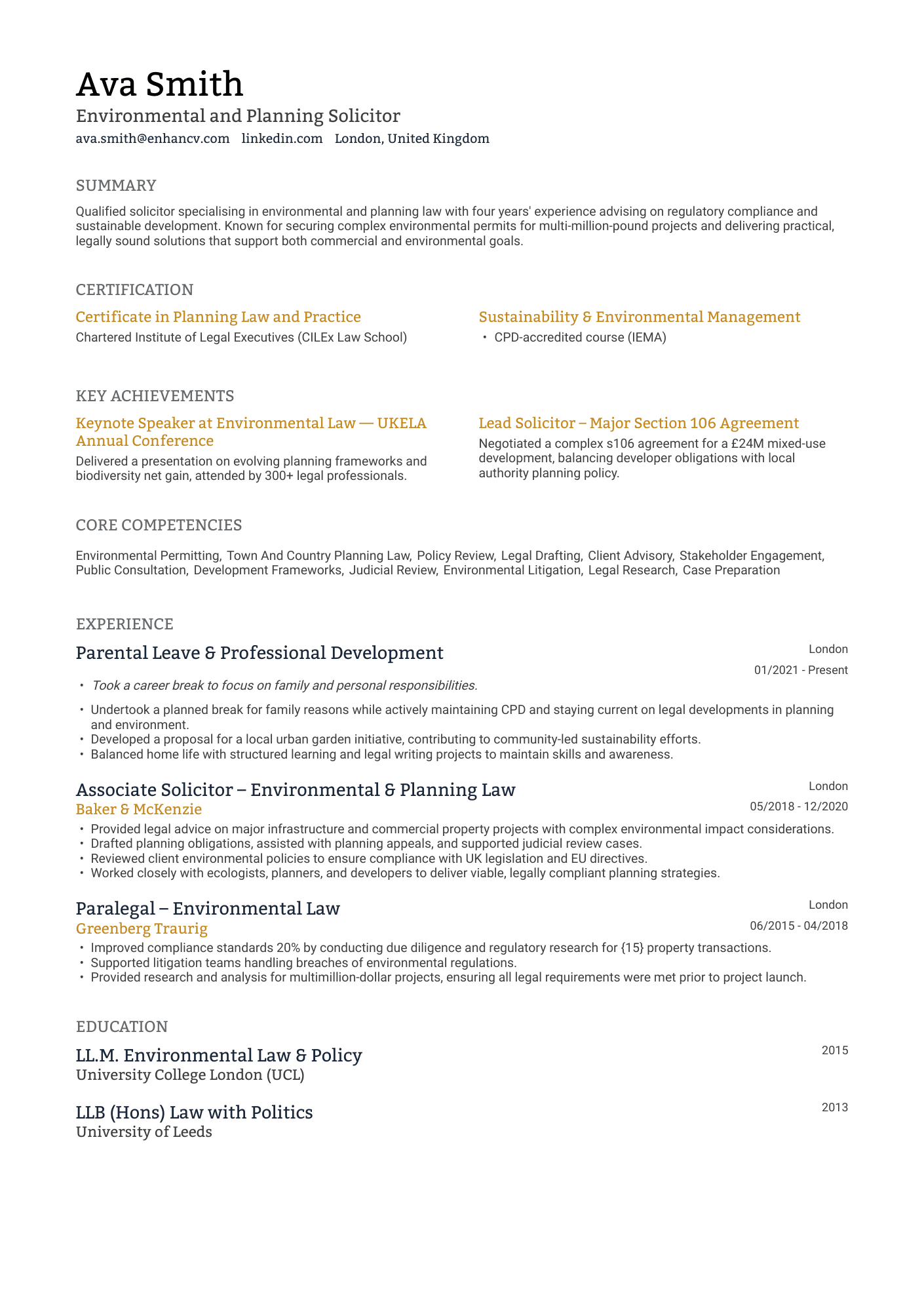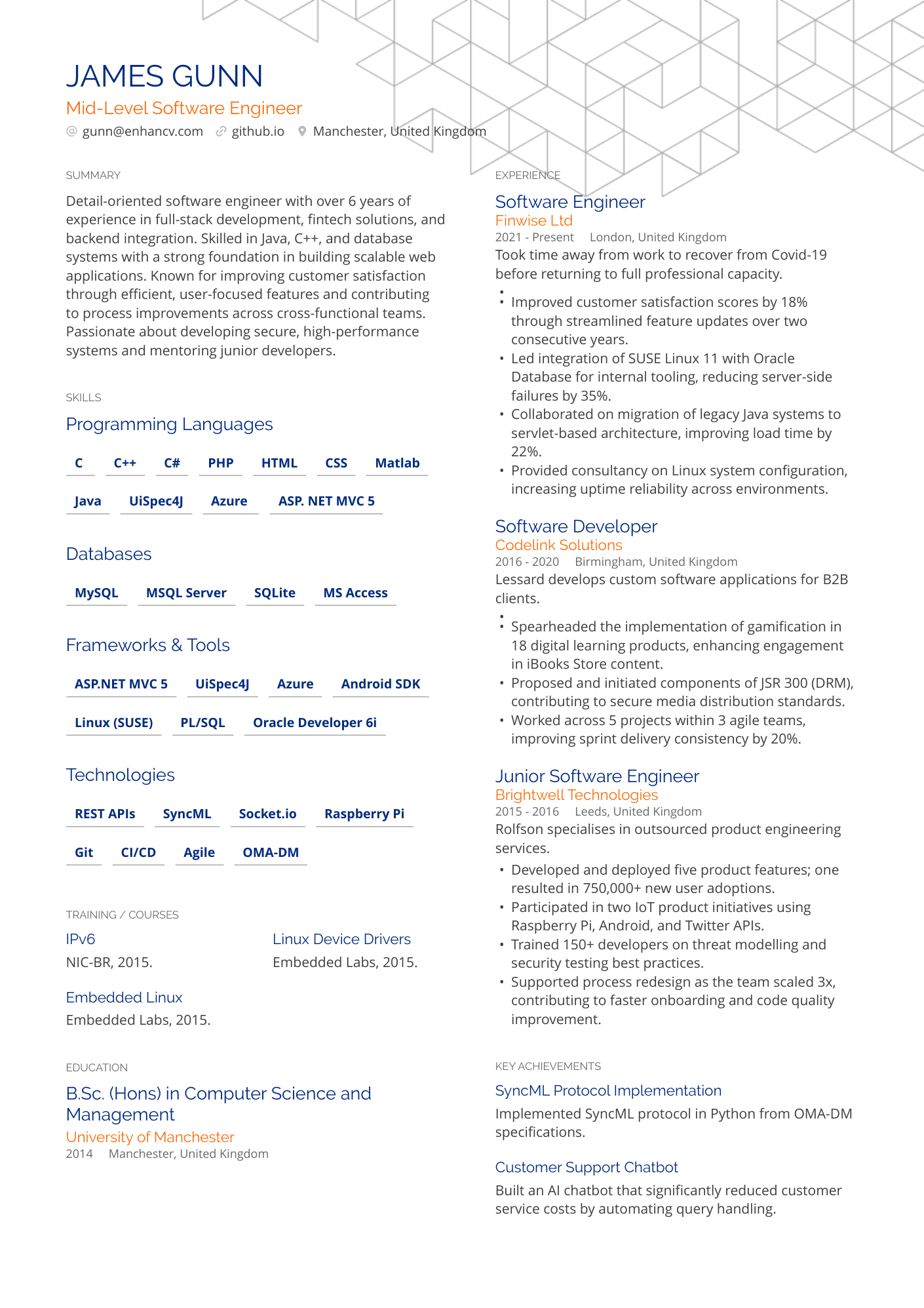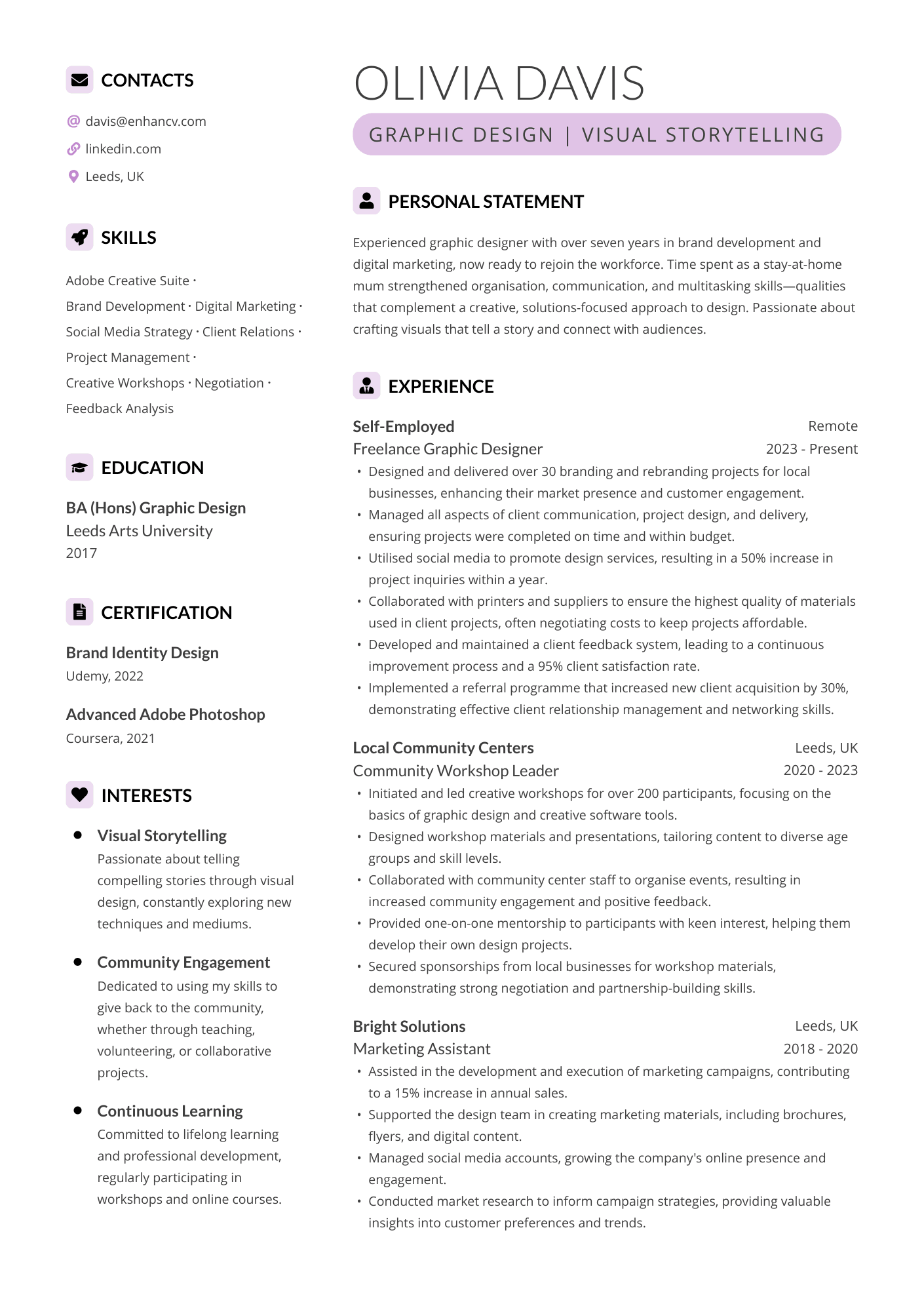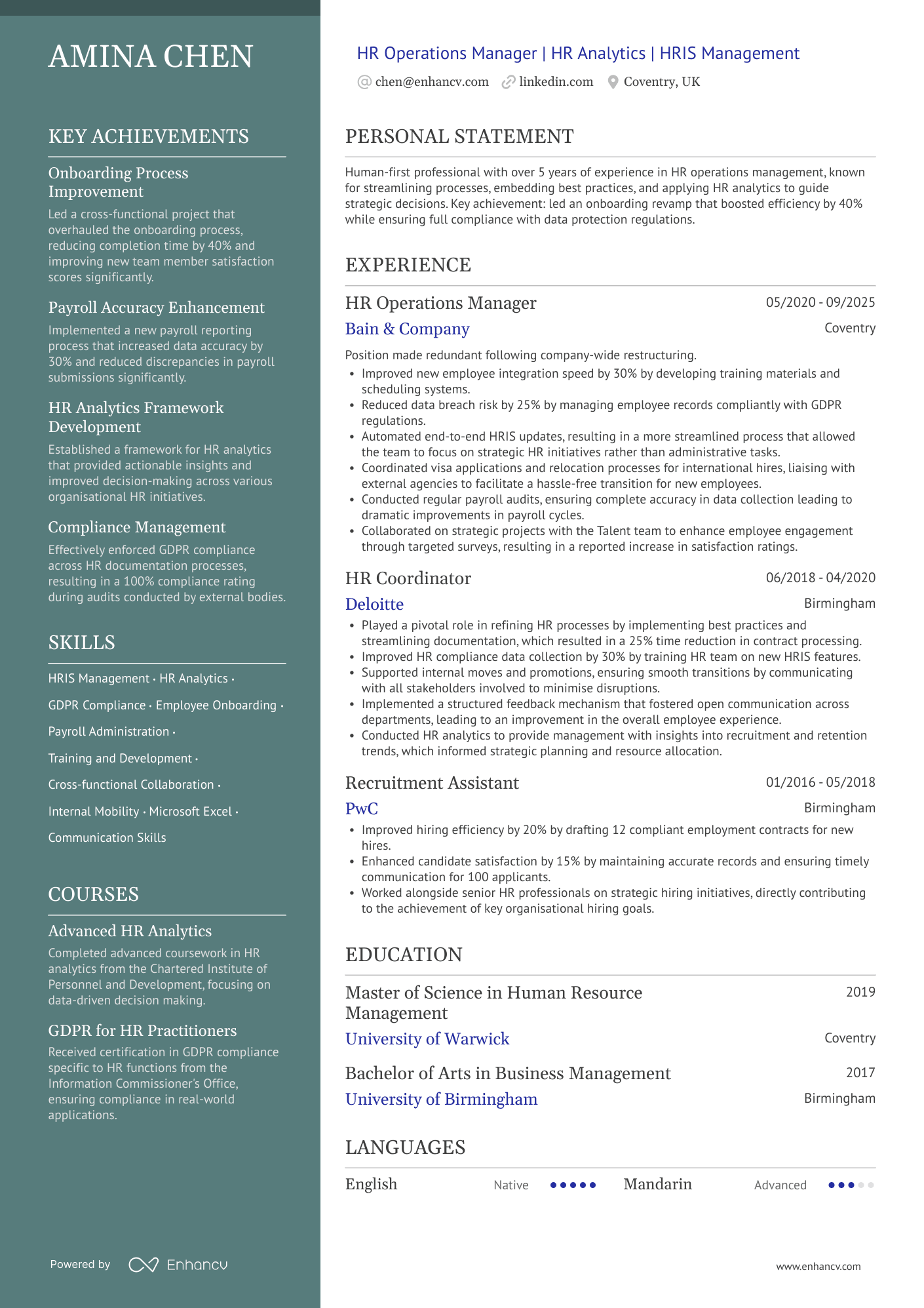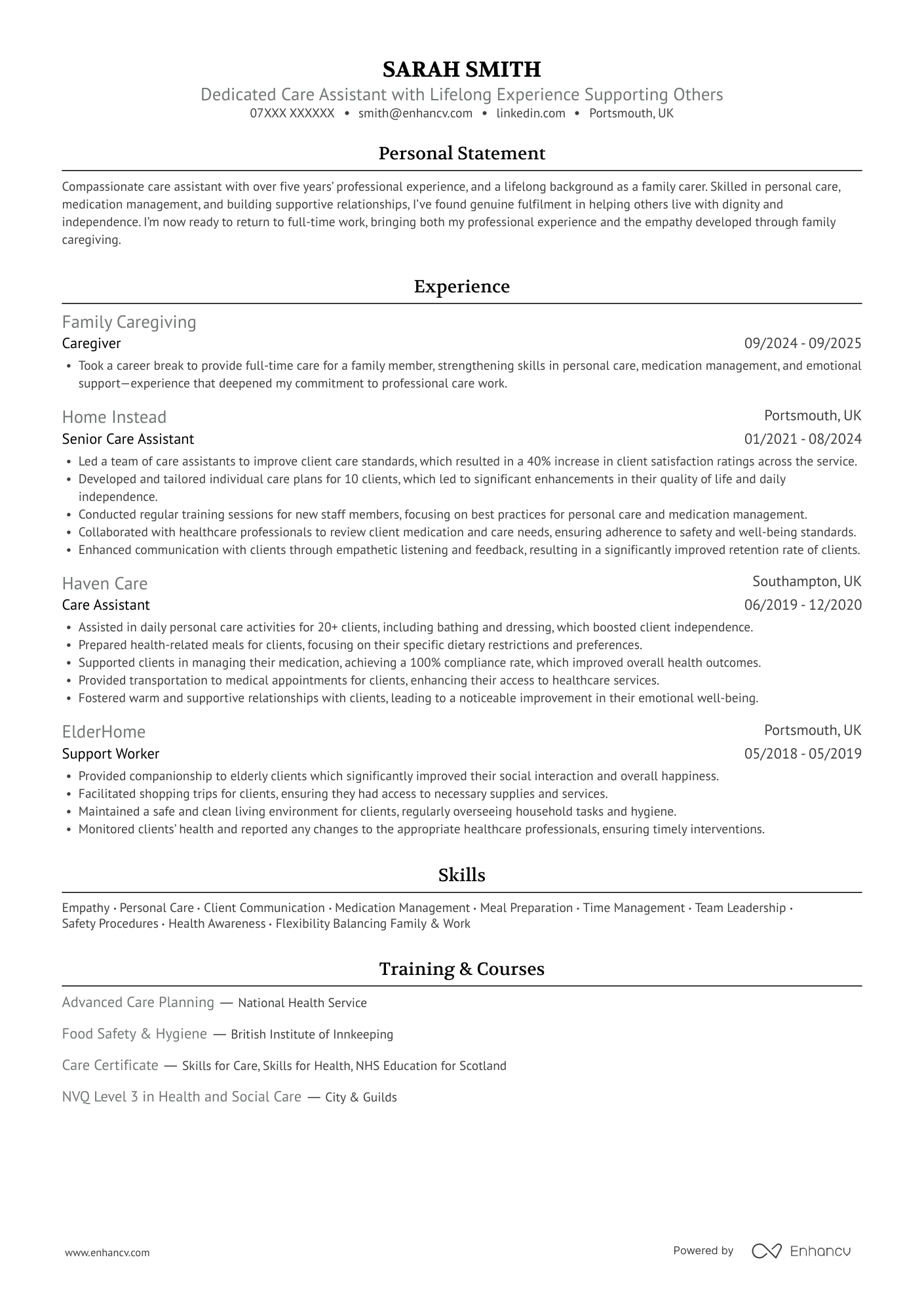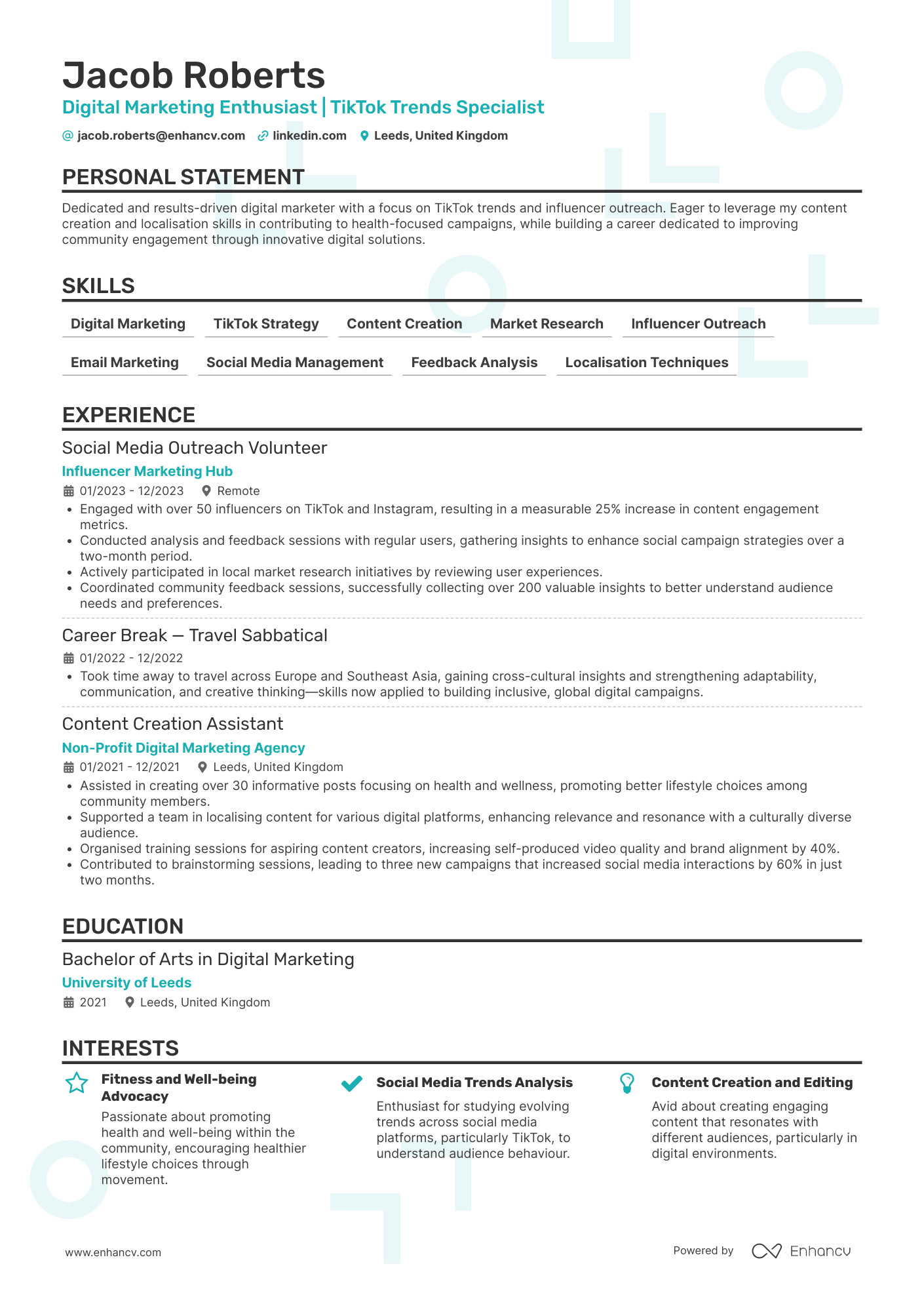Having employment gaps is enough to make any candidate break into a cold sweat. Time was, these breaks were serious red flags for employers. But those days are over.
Gaps in employment are becoming more and more common, and for a multitude of reasons,
In 2025, 24% of British job seekers had a gap of 12 months (or more) on their CV. That’s shot up from just 18% back in 2020.
However, how you frame your employment gaps matters. Submit a CV that has huge periods unaccounted for, and you may raise a few eyebrows. Recruiters may question why you weren’t in work while applicant tracking systems (ATS) could flag these gaps as an issue. You already know the importance of first impressions, and so positioning your CV well could make all the difference.
In the following guide, we’ll take a look at precisely how you can explain gaps in your employment, what to include on your CV, and how to use your cover letter to add some much-needed context.

Key takeaways
- Career gaps are common and rarely a deal-breaker today. Just make sure you frame them as an asset, not a downfall.
- Explain gaps briefly and don't leave empty space on your CV.
- Be honest, but focus on what you gained (such as skills) during the break.
- Use a skills-based or hybrid format to shift focus from your work experience.
- Highlight any learning, volunteering, or freelance projects.
- Stay confident, and show that your break is part of your professional growth story.
How does your CV measure up to hiring manager expectations? Upload it now to find out.
Is your CV good enough?
Drop your CV here or choose a file. PDF & DOCX only. Max 2MB file size.
Contrary to popular belief, having gaps in employment isn’t the end of the world.
First up, let’s talk about what actually counts as a career break and why.
What counts as an employment gap?
Employment gaps may sound big and scary, but what counts as one? While there’s no official definition, anything over the three-month mark can be safely classed as a gap.
Let’s take a look at some of the reasons you may take a career break:
- Caring responsibilities: You may need to take a step back from full-time work to care for a child, elderly family members, or loved ones.
- Redundancy: If you were made redundant, you may have a period of not working while you find a new role.
- Health reasons: Should you have struggled with a long-term condition, you may have had to have time off to recover or undergo treatment.
- Relocation: Whether you’re moving cities or countries, finding a job in your new location will usually take some time.
- Sabbatical or travel: You may have taken some time out for personal development, travel, or simply a break. This is more common in project-based careers, but anyone can choose to take a break.
- Starting a business: Launching a venture or going freelance gives you a wealth of experiences, which can help you re-enter the corporate world.
- Career change: You might have gone back to university or stepped away from your former career to retrain in something new.
- Bereavement: Losing a loved one can be heartbreaking and may lead to mental health complications. Many people take a career break to recover.
- Burnout: One in three Brits experiences high levels of pressure at work, which can lead to burnout. Taking some time to recover and tend to your mental health is natural.
Sometimes, career breaks are out of your hands, and hiring managers will know this. Reasons may include:
- Industry norms: In some careers—such as acting, for example—it’s standard to take on a contract, have a break, and then pick up the next project.
- The pandemic: Having a gap between March 2020 and March 2021 should come as no surprise. 11.7 million Brits were furloughed during this time (you weren’t alone!).
- Economic downturn: When the economy tanks, job security is one of the first things to go. That’s not your fault, and hiring managers will be aware of it.
Should you mention an employment gap on a CV at all?
The short answer is yes. Honesty is always the best policy, and not explaining your time away from the workforce can look suspicious. Don’t try to cover up the gap in your work experience section by stretching the truth. Lying on your CV is a big no-no. It will catch up with you and can land you in trouble.
Of course, there’s a difference between an unplanned gap and a planned one. Planning to take a year out to travel doesn’t feel the same as spending a year looking for work. Whatever the case, it’s important to be clear and confident about the reason for the gap.
That said, not every gap needs a detailed explanation. Sometimes it’s better to keep things brief—or leave them out altogether.
Don’t mention an employment gap…
- When it’s a long time ago: If the gap happened more than 7–10 years back, it’s rarely relevant. Employers focus on your recent experience—they won’t dig that far unless it’s directly tied to the role. Instead, drop early, less relevant roles from your CV and focus on your recent, stronger experience.
- When it’s already explained elsewhere: If you’ve covered the gap in your cover letter, LinkedIn, or during interviews, you don’t need to repeat it on your CV. Repetition can make it sound defensive.
- When it doesn’t affect your qualifications for the job: If the gap was relatively short—around two to three months—and has no impact on your ability to do the job, there’s no need to explain it. When your skills are current and you’re returning to the same industry, a clear, results-focused CV will speak louder than any justification.
Whatever the case, it’s important to be clear about your reasoning on your CV. While employers may not discount you because of your gaps, they will likely notice them.

Why employers notice employment gaps on CVs
Employment gaps naturally interrupt the story your CV is telling. A missing year or two can raise questions. The hiring manager may ask the following: were you unemployed, changing direction, or dealing with something personal? They want to understand context so they can gauge your reliability and commitment to your career.
Historically, career gaps were seen as warning signs that a candidate was inconsistent or hard to retain. While attitudes have softened, some decision-makers still hold these outdated assumptions. If you fail to explain why you have a gap, hiring managers may unfairly presume that you quit or were let go frequently.
The good news? You can control the narrative. Addressing your employment gaps directly, whether through your CV format, summary, or cover letter, shows a level of transparency and self-awareness. Skip it, and you risk letting others fill in the blanks for you.
Luckily, there’s a right way to go about framing any pesky employment gaps.
How to frame and explain a gap on your CV
Let’s take a look at how you can explain any employment gaps on your CV so that they don’t raise the alarm for the reader. You can cover gaps in different sections of your CV, so long as you position and explain them well enough.
Tip #1: Be honest yet strategic
Be honest about the fact that you had a break in your career, but show it in a positive light. Talk about what the gap taught you, and how you spent the time off better preparing for your future career.
Here’s an example of how you can blend the two in your personal statement:
Personal statement
Digital Account Manager with 10+ years of experience. Recently took a career break to look after a family member while remaining committed to professional growth by completing Google Analytics 4 and Google Ads certifications with the Digital Marketing Institute.
You can elaborate on the courses in your certificatesor education section. However, mentioning something key like this up top is a great way to cover all bases.
Tip #2: Become a masterful storyteller
It’s not what you say. It’s the way that you say it. Your CV is your number one marketing material, after all. Use narrative techniques when you’re writing about the employment gaps you have.
Instead of simply leaving the breaks to speak for themselves, address them and add some context. Within your work experience section, personal statement, and cover letter, you have the space to include details of why you have gaps in your career and what you did during them.
Let’s take a look at a good example of an experience entry that seamlessly integrates a career break:
Experience
Career break- 2020–2022
After several years in ops management, I paused my career to relocate internationally. During this period, I stayed engaged in the field by taking 8 consulting projects for small businesses in the hospitality and leisure sector, one of which reduced operational costs by 15%.
Show the hiring manager that you didn’t completely drop the ball. However, you stayed up to date with the field—whether through courses, projects, or simply industry magazines—say so now.
Tip #3: Be selective about what you include
The reader doesn’t need to know the whole story, unless it shows why you’re a great employee. If, for example, you took a break because your mum was battling an illness, you don’t have to overshare. You can keep things simple and say that you were looking after a family member.
Equally, if you were let go from your previous job and struggled to find work, focus on how you stayed proactive. For instance, you could talk about any volunteering you did, the courses you took, or any freelance work you carried out. All of the above shows you stayed current.

What if you simply took time off?
Not every break has to be filled with professional activity—and that’s perfectly fine. If your time away didn’t directly contribute to your career, simply keep it brief and honest. For example, you might write “Took a career break to focus on caring for a family member.”
Avoid overexplaining your career gap in this case. You run the risk of looking like you’re protesting too much, which may seem like you’re trying to hide something. Instead, focus on your return and what transferable skills you’re bringing to the job.
Tip #4: Tailor your explanation to the job
Whenever you’re applying for jobs, it’s important to tailor your CV accordingly. Refer back to the job description, and take a look at what the hiring manager emphasised. If the criteria mentions the Agile methodology, you might reference a course you took to brush upon this in your employment gap.
Now that you know how to frame career breaks, let’s talk about the ways you can bolster your CV to pull focus from them.
Key strategies to shift attention away from your employment gap
Worried that the hiring manager will get hung-up on your employment gaps? While you can explain them away, you also need to make sure there’s value elsewhere on your CV. Giving the reader something they can really sink their teeth into may be the answer.
Check out our strategies:
Use a skills-first or hybrid CV format
When creating a CV, there are three main formats to choose from: reverse chronological format, skills-first format, and the hybrid format (which is a combination of the other two).
For most CVs, we recommend a reverse chronological structure. It’s what hiring managers expect to see, presenting your experience in reverse order—starting with your most recent role. This format suits professionals with a steady, uninterrupted career path.
However, to avoid accentuating your career breaks, you may want to opt for either the skills-based or hybrid formats. These spotlight your talents and key skills over your formal work experience.
Let’s take a look at a skills-based CV example with employment gaps:
And, here’s a hybrid CV example that minimises the time away from the workforce. The gap is briefly explained under the most recent experience entry:
Choose the format that best showcases the value you bring without relying too heavily on a linear work history.
Focus on your transferable skills
Whatever you did during your employment gap, chances are, you picked up a wealth of transferable skills. These soft skills help you get things done no matter what field you’re in.
Let’s take a look at some top examples and how you may have honed them:
- Emotional intelligence, demonstrated through caring for a family member.
- Organisation and time management developed during a career break.
- Networking skills strengthened by attending weekly sessions during job search.
How to add transferable skills to your CV
Start by jotting down the soft skills you’ve been working on lately. While you don’t have to mention every one that comes to mind, picking out a few that align with the job is smart. You can add these into your skills section or include your break as a point in your experience section, noting the skills it taught you:
Experience
Career break (July 2024 – June 2025)
Took time away from work to care for a family member while remaining professionally active. During this period, I developed strong organisational and time-management skills by coordinating complex medical appointments and household operations.
Including some much-needed context of how you honed each skill is a good idea. This acts as evidence that the hiring manager can point to when reviewing your CV.
Highlight any learning or certificates
You may not have been formerly employed, but were you still learning? If the answer is yes, now’s the time to talk about it. Showing that you undertook online learning, training, or gained certificates proves that you still had your mind focussed on your career.
Here’s an example of how you might do that:
Certificates
Google Project Management Certificate, Coursera – May 2023
Developed practical skills in project planning, risk management, and stakeholder communication.
Digital Marketing Fundamentals, Google Digital Garage – Jan 2023
Covered SEO, social media strategy, and analytics tools to improve online visibility.
Add the certificates to a specific section, as we have above. You can also mention them in your cover letter to make sure the hiring manager understands how they fit into your timeline.
Add in freelance or volunteer work
Freelance and volunteer work is a great way to stay in touch when you’re searching for a job. You can create dedicated sections for each of these in the same format you’d use for your work experience section. However, be sure to label this clearly so each experience doesn’t look like a full-time role.
Here’s how you can lay out a freelance work experience section:
Freelance projects
Social Media Consultant
Kim’s Boutique, London, UK (Sept 2023)
- Created and managed social media campaigns across Instagram and Facebook, increasing engagement by 40%.
- Developed a monthly content calendar and optimised ad performance.
Freelance Copywriter
HLP Listings, Remote (Jul 2023 - Aug 2023)
- Wrote website copy, blog posts, and newsletters for small businesses
- Focused on clear messaging and consistent brand tone.
And, here’s how a volunteer work section could look:
Volunteer Experience
Event Coordinator
Hope for All Charity, London, UK (Jan 2024 – Jun 2024)
- Planned and delivered fundraising events that raised over £5,000.
- Coordinated a small team of volunteers and managed event logistics from start to finish.
Community Tutor
Read & Rise Initiative, Remote (Oct 2022 – Mar 2023)
- Provided weekly online tutoring sessions to adults improving their literacy skills.
- Created lesson materials and supported learners in reaching personal education goals.
In both cases, you can include bullet points below the project or position. Detail how this experience aligns with the job for which you’re applying.
Include tangible metrics on your CV
One of the fastest ways to get the reader’s attention is to add some tangible results. These will pull focus from your employment gaps, as they show that you’re a professional who can deliver. You might include the following examples:
- Precise times: You can share how long it took you to complete an epic piece of freelance work, how quickly you gained a qualification, or the hours you spent volunteering.
- Statistics: If you got results, put a number on them. For example, it’s better to say that you “improved efficiency by 20%,” rather than just that you “improved efficiency”.
- Grades: When talking about the certificates you’ve gained, be clear about your grades (so long as they’re above average!). If you’re a straight-A student, the employer needs to know.
- Numbers: Throw in any numbers that help the reader better understand your value. For example, you might say that you managed a “£100,000 marketing campaign”.
Emphasising other professional attributes is a great way to move the conversation away from your employment gaps. However, that doesn’t mean you should ignore it entirely.
What to say about your employment gaps (with examples)
Addressing the gaps on your CV doesn’t have to be uncomfortable. If you don’t know where to start, we’ve got you covered.
Take a look at what to say, and what not to say, below:
Short gap explanation example
Let’s say the gap is less than a few months long. You don’t need to sweat it. Simply keep your explanation short, and make sure that it focuses on the positives.
Explanation of a short gap on your CV
| Bad example | Good example |
|---|---|
| Experience: Unemployed (March 2024 – June 2024) | Experience: Career break (March 2024 – June 2024) Took a short break between roles to explore new career opportunities. |
Gap year example
Taking a year out to explore the world, or even your home town, is an experience in itself. You likely learned a wealth of lessons you can apply to your role. Be sure to highlight them.
Explanation of a gap year on your CV
| Bad example | Good example |
|---|---|
Experience: Gap year (March 2024 – March 2025)
| Experience: Gap year (March 2024 – March 2025)
|
Unemployment example
Being unemployed for some months or even a year is more common than you might think. Be honest about this, but also emphasise how you kept developing in this time.
Explanation of unemployment on your CV
| Bad example | Good example |
|---|---|
Experience: Unemployed (March 2024 – March 2025)
| Experience: Career break (March 2024 – March 2025)
|
Career break example
Perhaps you took a career break to pursue something completely different. That may have been writing a book, starting a family, or launching a business. Whatever the case, be clear about it.
Explanation of a career break on your CV
| Bad example | Good example |
|---|---|
Experience: Career break (May 2024 – Dec 2025)
| Experience: Sabbatical (May 2024 – Dec 2025)
|
Caring responsibilities example
Of course, one of the most common reasons for employment gaps is also the most noble. Having to care for a loved one can quickly become a full-time job. Most employers are compassionate to this.
Explanation of caring responsibilities on your CV
| Bad example | Good example |
|---|---|
Experience: Unemployed (Mar 2024 – Aug 2025)
| Experience: Caring for family members (Mar 2024 – Aug 2025)
|
Next up, we’ll take a look at some full CV examples you can use for inspiration.
Career gap CV examples
By this point, you should feel prepared to create your own CV with employment gaps. How you format yours will depend largely on your circumstances.
Here are some sample CVs with gaps in employment made with Enhancv’s AI Resume Builder:
Example 1: Parental leave
If you took time off to have a child, there’s no need to hide it. Instead, downplay the gap by highlighting the skills you strengthened during that time—or any freelance or creative work you did to stay sharp.
Example 2: Redundancy with upskilling
Being fired or made redundant can shake your confidence, but it’s best addressed openly and confidently. The example below shows how to mention a redundancy briefly within your job description while keeping the focus on achievements and continued professional growth.
Example 3: Caring for a family member and soft skills
If you ended up caring for a family member—and could no longer work—be upfront about that. Focus here on the soft skills that you learned during this period.
Example 4: Travel (or sabbatical) and life experience
Taking time off to travel is a great way to enrich your mind and learn new things. Highlight this when you’re adding this experience to your next CV.
Whatever your reason for having a gap in your employment, you can position it to your advantage. You’re always learning new things, no matter what you’ve been doing.
To build a clean, professional CV of your own, browse Enhancv’s CV templates and tailor your chosen design within the app.
How to talk about the gap in an interview
If you’ve nailed your career gap CV, you might land an interview. Of course, talking about this break face-to-face can be nerve-racking. But it doesn't have to be. There’s no need for you to bring up the gaps in your CV for no reason. However, if the interviewer does, you should be ready.
Here’s how to prepare.
Prep for common interview questions
You don’t want to be caught off guard. Before the big interview, be sure to prepare your answers to the common questions about career gaps. Take a look at our table for some help.
How to talk about your employment gaps
| Question | How to answer it |
|---|---|
| Can you tell me about the gap in your employment history? | Be honest and say why you were out of work. Focus on the skills you picked up, and how they prepared you for your return. For example: “I took a career break to look after my dad, who has a long-term condition and needed support. During my time looking after him, I gained organisational skills though managing his medical appointments, while also handling the household finances using Excel.” |
| Why did you decide to take a break? | If you chose to take a career break, talk about the other projects you pursued or what you gained from taking some time off. For example: “After 10 years with my agency, the opportunity to take a six-month sabbatical came up. I decided to take it and use the time travel and immerse myself in new cultures.” “The experience taught me problem-solving in unfamiliar situations, as I didn’t speak the native language. I returned with a fresh perspective and ready to dive back into work.” |
| Are you ready to return to full-time work? | The hiring manager needs to know that you’re ready to come back to work. Reassure them that this is the case, and talk about how you’ve been preparing (e.g. volunteering). For example: “Absolutely. I took a break to focus on my mental health and am now fully refreshed and ready to take on a full-time position.” “To help me prepare for this, I have been volunteering Mondays to Wednesdays at a local charity call centre. This has enabled me to get back into a stable routine.” |
| How does your break make you a better fit for this role? | Talk about the transferable skills you picked up and how they align with this job. For example: “Travelling to five countries in four months increased my resilience. I was faced with challenges I’d never encountered before—such as managing a complicated itinerary and dealing with unexpected travel delays.” “I believe that I navigated these issues well, which aligns perfectly with project management. I now feel better equipped to be malleable when problems arise and adapt to changing situations, both in the workplace and beyond.” |
Be positive and confident in your tone
One of the biggest mistakes candidates make is being ashamed of career breaks—and making that obvious. As we’ve covered in this guide, there are plenty of valid reasons to have a gap on your CV.
Confidence is king here. Have a prepared answer (see above!) that you can whip out when the question comes up. Don’t overexplain yourself, as this can sound defensive.
Move the conversation to your skills and fit
Finally, you’re going to want to pivot. That means not lingering on your employment gap for too long and instead moving onto the skills it taught you. Frame the experience as part of your learning and talk about how it’s prepared you to take on this new job.
Frequently asked questions about employment gaps on CVs
Ready to get started? Before you do, check out our answers to some of the frequently asked questions on the topic of employment gaps.
Will a 6‑month gap ruin my career?
The short answer is no. However, when you’re positioning your CV, be honest about your career gaps. Pinpoint your transferable skills and draw attention to any other experience you had.
Should I exclude the gap entirely?
Leaving the gap off your CV may seem like a wise move, but it can look suspicious, especially if it’s longer than six months. The hiring manager will naturally wonder what you did during this period. Save them the trouble of asking—or worse, rejecting your application—by being straightforward from the start.
Is it better to write “career break” or leave it blank?
You can either write “career break” or be more specific about what you were doing. For example, if you were travelling or volunteering, you may want to include this level of detail.
Does industry change how gaps are viewed?
Yes, how employment gaps are seen will depend on industry norms. In some fields, such as academia and finance, taking large breaks after projects may be the standard.
Takeaway
Having an employment gap on your CV won’t destroy your chances of landing a new job. However, it’s important to frame these breaks well. Tailor your CV to meet the needs of the job and focus on the transferable skills you learned during the gap. You may also choose to use a non-traditional format, such as a skills-based structure. Get started now using Enhancv’s drag-and-drop AI CV Builder.

